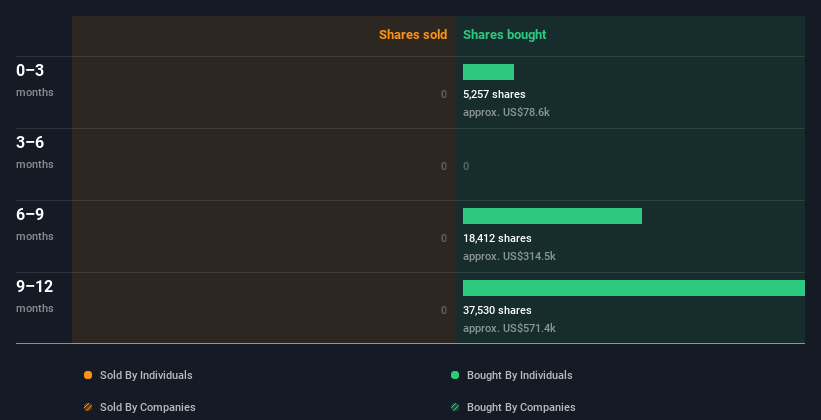Insider Spends US$64k Buying More Shares In First National
Whilst it may not be a huge deal, we thought it was good to see that the First National Corporation (NASDAQ:FXNC) Independent Director, James Wilkins, recently bought US$64k worth of stock, for US$15.01 per share. Although the purchase is not a big one, increasing their shareholding by only 1.5%, it can be interpreted as a good sign.
Check out our latest analysis for First National
The Last 12 Months Of Insider Transactions At First National
Over the last year, we can see that the biggest insider purchase was by Independent Vice Chair of the Board & Secretary Gerald Smith for US$76k worth of shares, at about US$16.45 per share. That means that even when the share price was higher than US$15.40 (the recent price), an insider wanted to purchase shares. It's very possible they regret the purchase, but it's more likely they are bullish about the company. To us, it's very important to consider the price insiders pay for shares. Generally speaking, it catches our eye when insiders have purchased shares at above current prices, as it suggests they believed the shares were worth buying, even at a higher price.
First National insiders may have bought shares in the last year, but they didn't sell any. You can see a visual depiction of insider transactions (by companies and individuals) over the last 12 months, below. If you want to know exactly who sold, for how much, and when, simply click on the graph below!
There are plenty of other companies that have insiders buying up shares. You probably do not want to miss this free list of growing companies that insiders are buying.
Insider Ownership
Looking at the total insider shareholdings in a company can help to inform your view of whether they are well aligned with common shareholders. I reckon it's a good sign if insiders own a significant number of shares in the company. First National insiders own about US$15m worth of shares. That equates to 16% of the company. This level of insider ownership is good but just short of being particularly stand-out. It certainly does suggest a reasonable degree of alignment.
So What Does This Data Suggest About First National Insiders?
It's certainly positive to see the recent insider purchases. And the longer term insider transactions also give us confidence. Insiders likely see value in First National shares, given these transactions (along with notable insider ownership of the company). So while it's helpful to know what insiders are doing in terms of buying or selling, it's also helpful to know the risks that a particular company is facing. Case in point: We've spotted 2 warning signs for First National you should be aware of.
Of course, you might find a fantastic investment by looking elsewhere. So take a peek at this free list of interesting companies.
For the purposes of this article, insiders are those individuals who report their transactions to the relevant regulatory body. We currently account for open market transactions and private dispositions of direct interests only, but not derivative transactions or indirect interests.
Have feedback on this article? Concerned about the content? Get in touch with us directly. Alternatively, email editorial-team (at) simplywallst.com.
This article by Simply Wall St is general in nature. We provide commentary based on historical data and analyst forecasts only using an unbiased methodology and our articles are not intended to be financial advice. It does not constitute a recommendation to buy or sell any stock, and does not take account of your objectives, or your financial situation. We aim to bring you long-term focused analysis driven by fundamental data. Note that our analysis may not factor in the latest price-sensitive company announcements or qualitative material. Simply Wall St has no position in any stocks mentioned.

 Yahoo Finance
Yahoo Finance 
